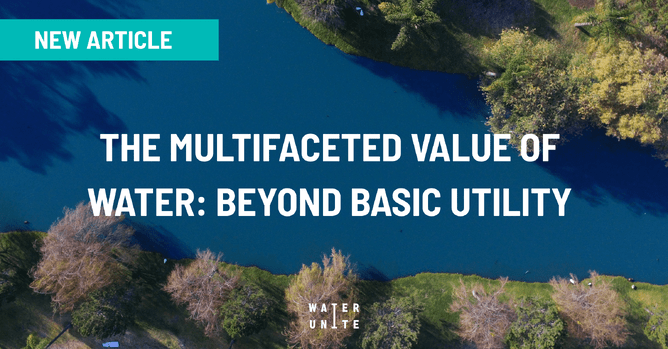Beyond its basic utility in sustaining life, water has a multifaceted value with substantial cultural, economic and environmental importance. This article will explore the significance of water, the ways it transcends its fundamental role to influence nearly every aspect of culture, economy and environmental sustainability and how organisations like Water Unite can help develop long-term sustainable WASH solutions that recognise the many fundamental roles of water in communities around the world.
The Cultural Significance of Water
Water has always held great cultural significance for civilisations throughout history. In faith-based traditions around the world, water can represent qualities as diverse as life, purity, rebirth, and reconciliation, as well as chaos and destruction. Some cultures consider water as a divine gift for humanity to care for, while others emphasise water's value to the ecosystem and wildlife (UNESCO World Water Assessment Programme, 2021).
The relationship between water and place is profound in many indigenous cultures. For example, indigenous peoples in the Arctic have intertwined knowledge and values about water, ice, and snow into the group's cultural life. Certain cultural groups regard water as a sentient person. For example in New Zealand, recognition of the importance of water’s relational value to place and culture led to the granting of legal personhood and protection to the Whanganui River, under the custodianship of the local Maori People (UNESCO World Water Assessment Programme, 2021).
In the modern era, the global consensus on water values is evident in established principles such as the right to safe drinking water and sanitation. Sustainable Development Goal 6 (SDG 6) recognises water's transversal value as it is not only integral in meeting basic needs, but also in fostering a global culture of sustainability. Water Unite is dedicated to contributing to the accomplishment of SDG6. This commitment stems from a broader acknowledgment that achieving these goals requires enhanced collaboration and the development and implementation of new business and investment models to address the missing middle.
The Economic Importance of Water
The economic value of water extends far beyond its basic utility. The annual economic value of water and freshwater ecosystems is $58 trillion, or 60% of global GDP (Fallah, 2023).
Water plays a pivotal role in energy production, with industry and energy collectively withdrawing 19% of the world’s freshwater. In the Net Zero Emissions by 2050 Scenario (NZE) water withdrawals by the energy sector decline by almost 20 bcm by 2030. The most significant reductions occur in the power sector, where withdrawals fall by nearly 15% as coal-fired power generation is rapidly replaced by solar PV and wind (International Energy Agency). Greater energy efficiency also helps to reduce the amount of water required to meet global energy demand.
While wind and solar PV require little water, other renewable energy sources such as biofuels, solar power, carbon capture, utilisation, and storage, and nuclear power can be water-intensive. Emerging technologies, such as electrolysis for "green" hydrogen production, require a lot of water (International Energy Agency). Striking a balance between the need for cleaner energy and long-term water management is critical for navigating this complex relationship.
Water has a large impact on agriculture, serving as a critical input for food and production and playing an important role in global food security. Agriculture is the world's largest water user, accounting for 70% of all freshwater withdrawals. Irrigated agriculture accounts for 20% of cultivated land and accounts for 40% of global food output (World Bank, 2022). However, the growing global population, urbanisation, and climate change presents challenges to water security by intensifying competition for water resources.
It is predicted that in 2050, a population of over 10 billion will require a 70% increase in agriculture production (World Bank, 2022). Due to increased water demand, 25 - 40% of water may need to be shifted from activities with lower productivity and employment to those with higher productivity, employment and water efficiency. In water-stressed areas, this reallocation is critical. Unfortunately, agricultural water management is constrained by inadequate policies, poor institutional under-performance, and financial constraints.
Water plays an important role in the manufacturing process, influencing the sustainability and environmental footprint of a vast variety of industries and products. Raw materials such as metals, fuel, oil, lumber, chemicals, paper, and plastic undergo refining and transformation processes that demand significant water usage. Furthermore, the manufacturing facilities rely on water for fabrication, washing, cooling, boiling, sanitation, and even as a raw material within the production process. For instance, the production of a smartphone requires 3,190 gallons of water (Kremer, 2018).
Striking a balance between meeting consumer demands and mitigating environmental impact necessitates innovative approaches to minimise water consumption and promote responsible water stewardship within industrial settings. This is where Water Unite can help play a key role, finding and funding investable projects that both promotes better use of water and benefits local communities.
The Environmental Importance of Water
Water plays a pivotal role in maintaining ecosystem health and biodiversity. Freshwater ecosystems, including wetlands, rivers, mangrove forests, and aquifers, are integral to the global water cycle, helping to provide water purification and regulation of water flows. However, mismanagement and climate change pose significant threats to these ecosystems. Freshwater ecosystem biodiversity is rapidly declining, with freshwater species becoming extinct faster than terrestrial or marine counterparts. This alarming trend is exacerbated by habitat loss and pollution (United Nations).
Urbanisation, industry and agriculture all contribute to the loss of natural landscapes, exacerbating the impact on water quantity and quality. Climate change worsens these issues with flooding and increased rainfall increasing surface water area. In other areas, lakes, wetlands and floodplains are drying up due to reduced precipitation and/or unsustainable management (United Nations). This causes turbidity issues, and disrupts the delicate balance of these ecosystems.
Water's role as a regulator of climate and weather patterns is critical to the Earth's systems functioning. Oceans, in particular, have a significant impact on weather and climate by storing solar radiation, distributing heat and moisture globally, and driving weather systems. Changes in these patterns can have a knock-on effect on both ecosystems and human societies (Lindsey & Dahlman, 2023). Freshwater ecosystems play an important role in climate regulation by mitigating floods and droughts, but only if they maintain a delicate balance. However, this is threatened by man-made activities such as fertiliser runoff and animal waste products. Wetlands and glaciers regulate water flows, while coastal mangrove forests and river bank vegetation protect against erosion (United Nations). These ecological inputs are critical to the health of both natural ecosystems and human populations.
The Interconnected Nature of Water
The intricate balance of water use and conservation demonstrates the interconnectedness between cultural, economic, and environmental influences. Cultural practices have a significant impact on changing attitudes towards water, influencing consumption patterns, and determining conservation efforts. Traditional agricultural methods, for example, can have a significant impact on water usage. The economic consequences of environmental degradation linked to water misuse cannot be overstated and will have far-reaching, long term effects on agriculture, industry, and municipalities. Recognising the symbiotic relationship between cultural practices and economic interests is critical in developing effective long-term water management policies that holistically encapsulate the economic, environmental and cultural impacts.
As world population grows and developing nations move towards more industrialised, consumption led economic models, the demand on water resources and its misuse will only increase to satisfy short term goals. We must commit to long-term strategies for water management and protection. This is where Water Unite is working to fund projects that recognise and promote efficient, sustainable use of water to deliver measurable outcomes. By embracing sustainable practices, innovative technologies, and a shared commitment to responsible water stewardship, we will address challenges to the global water crisis.
Bibliography
Fallah, A. (October 16, 2023). Water crisis threatens $58 trillion in economic value, food security and sustainability.
International Energy Agency. (n.d.). Energy and Water.
Kremer, M. (2018, November 8). The Role of Water and Wastewater in Manufacturing. Retrieved from https://blog.jencoi.com/the-role-of-water-and-wastewater-in-manufacturing
Lindsey, R., & Dahlman, L. (2023). Climate Change: Ocean Heat Content. National Oceanic and Atmospheric Administration.
UNESCO World Water Assessment Programme. (2021). Culture and the values of water. The United Nations world water development report 2021: valuing water, 97-106.
United Nations. (n.d.). Water and Ecosystems.
World Bank. (2022). Water in Agriculture.
Author: Amelia Metcalf
Editors: Charlotte Macdonald, Louis Goring-Morris

